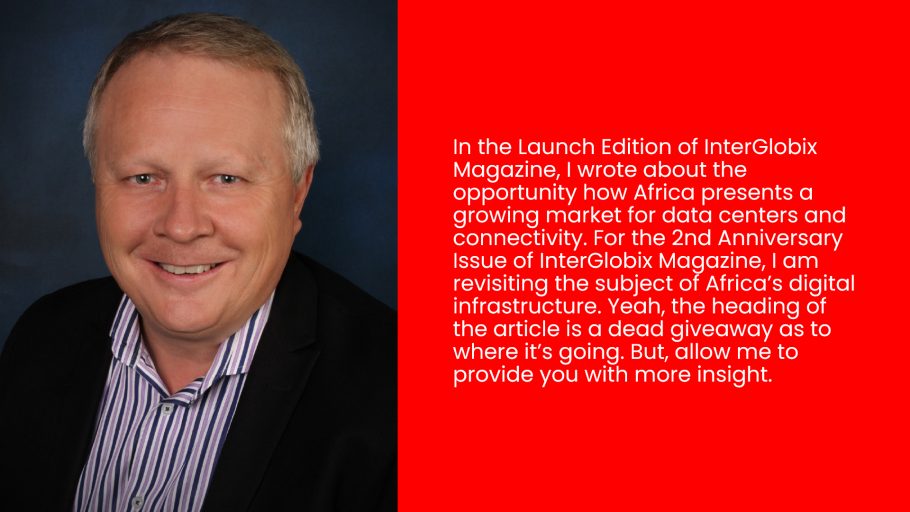Digital infrastructure in Africa revisited
Since 2017, Africa’s data center capacity has more than doubled. Yet, according to data from Xalam Analytics, this capacity accounts for less than one percent of the global total. More than 15 percent of the world’s population is in Africa. (Notice the gap?) The research firm expects demand for African data centers to grow three times faster than supply. (Notice the growing gap?) In a new report from Africa Data Centres Association (ADCA), they claim that Africa needs 1,000MW and 700 facilities to meet this growing demand.
The global pandemic has played a major role in fanning increased global demand for digital infrastructure. Organizations were forced to adopt online and remote execution strategies, because the events of the past two years necessitated it. Pressured to accelerate their digital transformation, many opted to seek shelter in the cloud. By direct implication, data centers and communication infrastructure are major components of the digital transformation journey. Data protection regulations, and the need to reduce latency for better content streaming and other latency-intensive functions, are also driving the worldwide shift toward data hosting closer to the end consumer. Even during this challenging time, Africa’s existing data center sites are expanding, and new ones are being built. The trend continues, unabated.
A Continent of Many Countries
From Cape Town to Cairo and from Marrakech to Mombasa, all over Africa for the past couple of years digital infrastructure has displayed growth and investment beyond expectations. Many locations are sprouting more data center capacity. Another driver is the projected population growth in Africa, especially the younger generation. It is estimated that at least 60 percent of Africa’s population is below 35. And, the youth are mobile, very mobile. By 2024, mobile technologies and services in Sub-Saharan Africa are expected to surpass US$184Bn. By 2025, just as smartphone penetration should hit 65 percent, with 678 million connections, operators will be expected to invest US$52Bn in network infrastructure.
According to the United Nations Department of Economic and Social Affairs, Nigeria alone is projected to have a population exceeding 320 million by 2040 and more than 400 million by 2050. It already has an Internet subscriber base that exceeds 135 million, more than any country in Africa or Europe. Solely looking at Africa’s most populous country speaks for itself, as the investments in expanded data center capacity continues. Lagos-based MainOne made its intentions clear by investing in additional digital infrastructure to capitalize on this. In the first half of 2021, they announced plans to expand their data center footprint in the city. Through their MDXi data center subsidiary, they want to increase capacity from 700 racks to 900 racks in 2022. If demand is sustained, they’ll slap on another 300 racks in 2023. Pending regulatory and other approvals, digital infrastructure giant, Equinix, will enter the African market through its acquisition of MainOne.
In August 2020, Rack Centre announced an expansion program to increase its white space to 6,000 square meters (64,500 square feet), allowing for 13MW of IT power in its Lagos campus. This follows on an investment made by Actis, a London private equity firm, taking a controlling stake in the business alongside Jagal. Rack Centre is developing additional buy-and-build opportunities across Africa. A US$250m pan-African data center platform, established by Actis and Convergence Partners, is funding this expansion. Other investments also will be made from this fund.

Taking its first step into Nigeria, Africa Data Centres (ADC), announced the building of a 10MW footprint in Lagos, which is already well underway. ADC probably has the broadest portfolio of data centers across the continent, backed up by the massive fiber network of its parent company, Liquid Telecom. Their phase-one investment in Nigeria, as stated by CEO Stephane Deproz, is more than US$100m. The pan-African company announced what is purported to be the largest continental data center expansion program in history. It aims to invest US$500m, doubling its footprint through the expansion of its existing sites and building new ones in Ghana, Cote d’Ivoire, Morocco, Senegal, Democratic Republic of Congo and Tunisia. Liquid Telecom owns and operates more than 100,000 kilometers (62,000 miles) of fiber across the continent, which is another critical component for digital infrastructure growth.
Earlier this year, African Infrastructure Investment Managers (AIIM), an infrastructure-focused private equity firm, acquired a majority stake in Ngoya Etix DC, a carrier-neutral data center in Accra, Ghana. Local, in-country data demand is among the drivers for their decision to invest, because there is a need to get content close to end users. At the end of 2019, PAIX Data Centres announced the opening of their first data center in Africa in Accra. Although smaller than Nigeria, Ghana together with Morocco is competing for a slice of West Africa’s digital infrastructure pie because of the undersea cables that pass along its coastlines. There’s also consideration for the opportunities in business continuity and disaster recovery in the region; and, not to mention serving the needs of its own populations. Raxio, a pan-African data center operator, is partnering with Meridiam, a French infrastructure investment firm, to deploy a network of data centers. Meridiam will inject US$48m into the venture and Raxio has already invested in data centers in the DRC, Uganda and Ethiopia.
ABOUT THE AUTHOR
Lee has been operating IT infrastructure for more than 25 years. He has a wide range of experience, ranging from IT Operations and Engineering through IT Infrastructure Management. Lee is an industry executive and founder of DataCenterDNA, a boutique consulting firm based in Northern Virginia, that provides specialist data center industry consulting and advisory services. Although living in the USA, Lee continues to be a very active participant in the African digital infrastructure industry.



